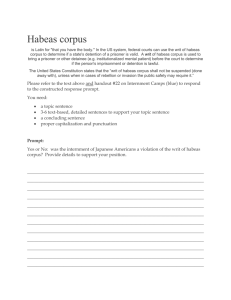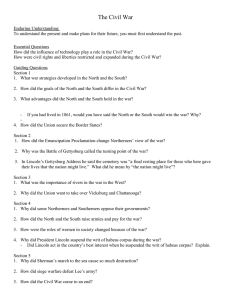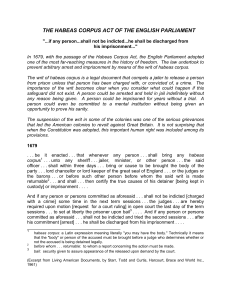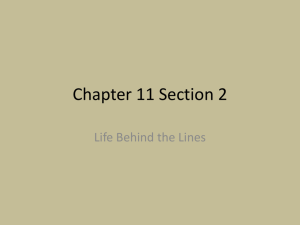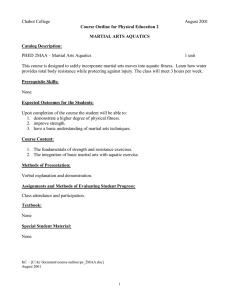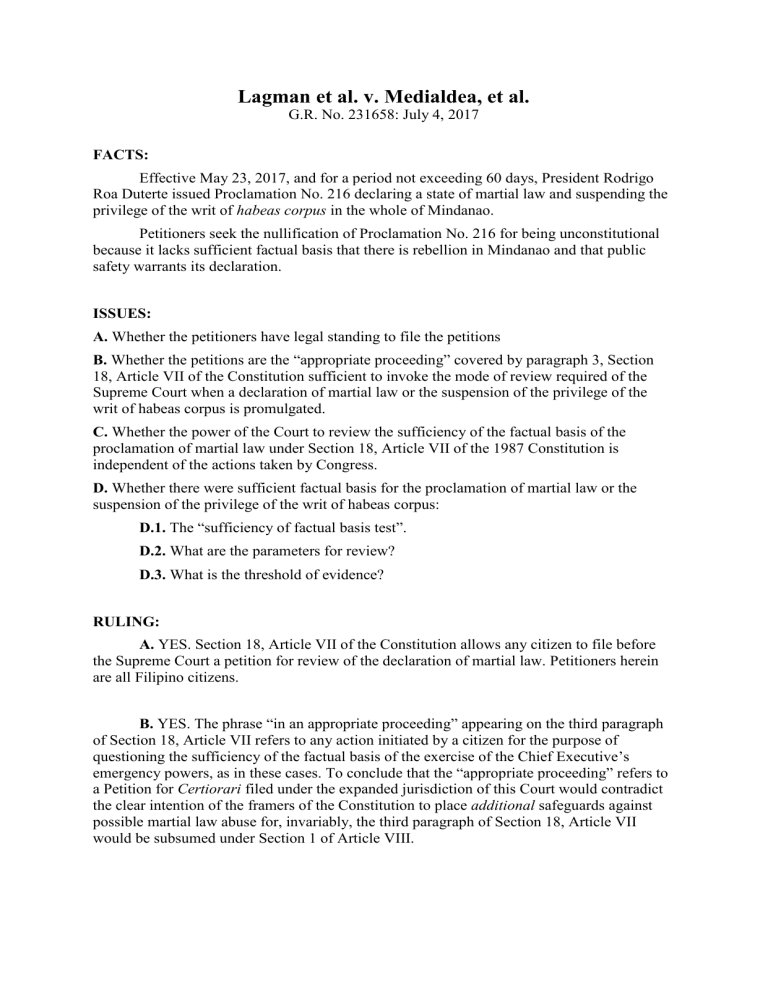
Lagman et al. v. Medialdea, et al. G.R. No. 231658: July 4, 2017 FACTS: Effective May 23, 2017, and for a period not exceeding 60 days, President Rodrigo Roa Duterte issued Proclamation No. 216 declaring a state of martial law and suspending the privilege of the writ of habeas corpus in the whole of Mindanao. Petitioners seek the nullification of Proclamation No. 216 for being unconstitutional because it lacks sufficient factual basis that there is rebellion in Mindanao and that public safety warrants its declaration. ISSUES: A. Whether the petitioners have legal standing to file the petitions B. Whether the petitions are the “appropriate proceeding” covered by paragraph 3, Section 18, Article VII of the Constitution sufficient to invoke the mode of review required of the Supreme Court when a declaration of martial law or the suspension of the privilege of the writ of habeas corpus is promulgated. C. Whether the power of the Court to review the sufficiency of the factual basis of the proclamation of martial law under Section 18, Article VII of the 1987 Constitution is independent of the actions taken by Congress. D. Whether there were sufficient factual basis for the proclamation of martial law or the suspension of the privilege of the writ of habeas corpus: D.1. The “sufficiency of factual basis test”. D.2. What are the parameters for review? D.3. What is the threshold of evidence? RULING: A. YES. Section 18, Article VII of the Constitution allows any citizen to file before the Supreme Court a petition for review of the declaration of martial law. Petitioners herein are all Filipino citizens. B. YES. The phrase “in an appropriate proceeding” appearing on the third paragraph of Section 18, Article VII refers to any action initiated by a citizen for the purpose of questioning the sufficiency of the factual basis of the exercise of the Chief Executive’s emergency powers, as in these cases. To conclude that the “appropriate proceeding” refers to a Petition for Certiorari filed under the expanded jurisdiction of this Court would contradict the clear intention of the framers of the Constitution to place additional safeguards against possible martial law abuse for, invariably, the third paragraph of Section 18, Article VII would be subsumed under Section 1 of Article VIII. C. YES. In reviewing the sufficiency of the factual basis of the proclamation or suspension, the Court considers only the information and data available to the President prior to or at the time of the declaration; it is not allowed to “undertake an independent investigation beyond the pleadings.” On the other hand, Congress may take into consideration not only data available prior to, but likewise events supervening the declaration. Unlike the Court which does not look into the absolute correctness of the factual basis, Congress could probe deeper and further; it can delve into the accuracy of the facts presented before it. In addition, the Court’s review power is passive; it is only initiated by the filing of a petition “in an appropriate proceeding” by a citizen. On the other hand, Congress’ review mechanism is automatic in the sense that it may be activated by Congress itself at any time after the proclamation or suspension was made. D. YES. A review of the aforesaid facts similarly leads the Court to conclude that the President, in issuing Proclamation No. 216, had sufficient factual bases tending to show that actual rebellion exists. The President’s conclusion, that there was an armed public uprising, the culpable purpose of which was the removal from the allegiance of the Philippine Government a portion of its territory and the deprivation of the President from performing his powers and prerogatives, was reached after a tactical consideration of the facts. In fine, the President satisfactorily discharged his burden of proof. After all, what the President needs to satisfy is only the standard of probable cause for a valid declaration of martial law and suspension of the privilege of the writ of habeas corpus. D.1. The phrase “sufficiency of factual basis” in Section 18, Article VII of the Constitution is the only test for judicial review of the President’s power to declare martial law and suspend the privilege of the writ of habeas corpus under Section 18, Article VII of the Constitution. The Court does not need to satisfy itself that the President’s decision is correct, rather it only needs to determine whether the President’s decision had sufficient factual bases. D.2. Section 18, Article VII itself sets the parameters for determining the sufficiency of the factual basis for the declaration of martial law and/or the suspension of the privilege of the writ of habeas corpus, ”namely (1) actual invasion or rebellion, and (2) public safety requires the exercise of such power.” Without the concurrence of the two conditions, the President’s declaration of martial law and/or suspension of the privilege of the writ of habeas corpus must be struck down. D.3 What the President needs to satisfy is only the standard of probable cause for a valid declaration of martial law and suspension of the privilege of the writ of habeas corpus. As Justice Carpio decreed in his Dissent in Fortun: In determining probable cause, the average man weighs the facts and circumstances without resorting to the calibrations of the rules of evidence of which he has no technical knowledge. He relies on common sense. A finding of probable cause needs only to rest on evidence showing that, more likely than not, a crime has been committed and that it was committed by the accused. Probable cause demands more than suspicion; it requires less than evidence that would justify conviction. Probable cause, basically premised on common sense, is the most reasonable, most practical, and most expedient standard by which the President can fully ascertain the existence or non-existence of rebellion, necessary for a declaration of martial law.
